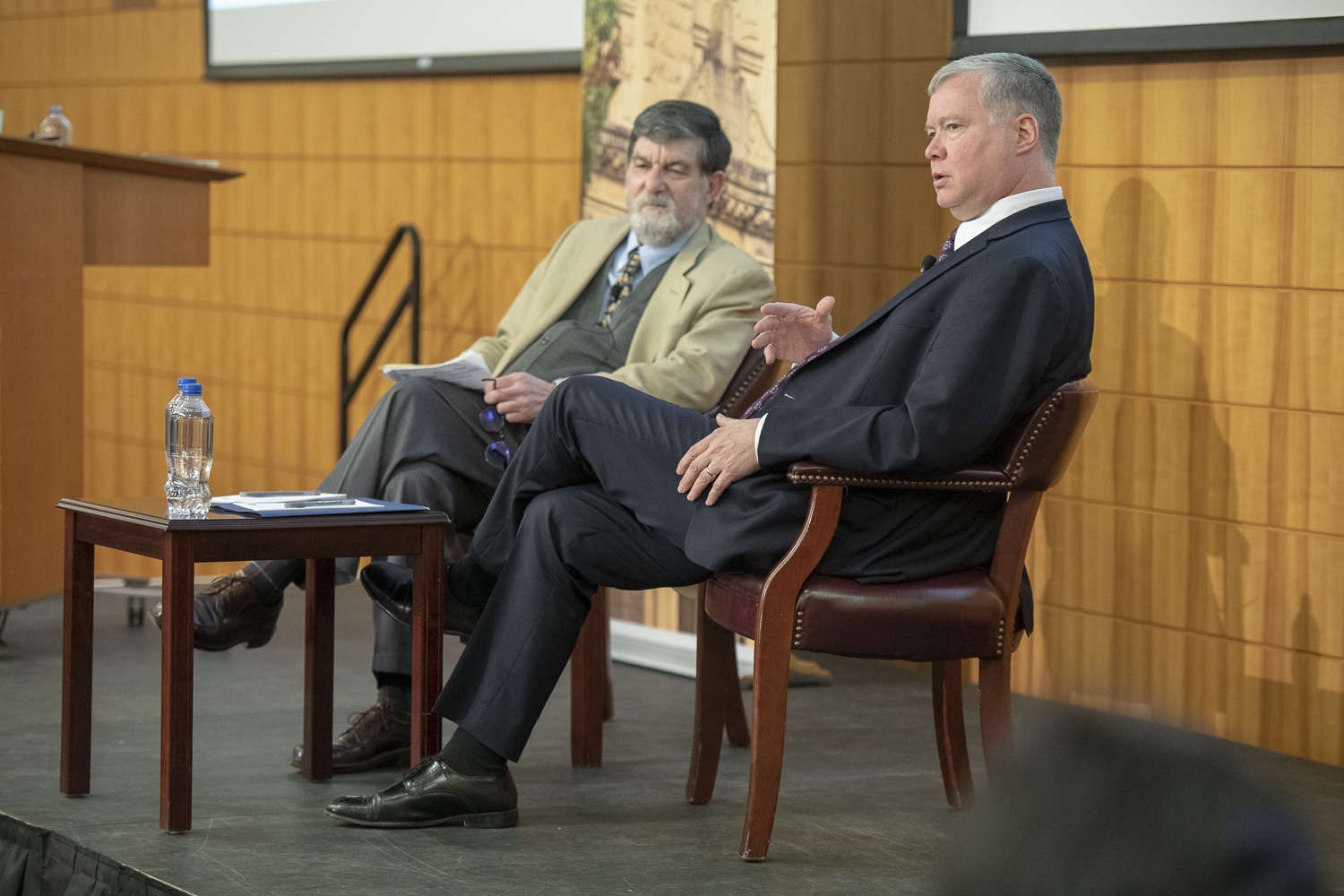Economic prosperity in North Korea is part of U.S. diplomatic vision, says U.S. Special Representative for North Korea at Stanford event
Stephen Biegun, the U.S. Special Representative for North Korea, spoke at Stanford University Thursday on opportunities and challenges toward the final, fully verified denuclearization of North Korea.
Should North Korea follow through on its commitment to complete denuclearization, the United States is prepared to explore ways to advance economic opportunities, said Stephen Biegun, the U.S. Special Representative for North Korea, in a talk delivered today at Stanford University.

After his remarks, Stephen Biegun, the U.S. Special Representative for North Korea (right), joined in conversation with Robert Carlin, a visiting scholar at the Center for International Security and Cooperation. (Image credit: L.A. Cicero)
Biegun, who was appointed by Secretary of State Michael Pompeo in August 2018 to direct U.S. policy on North Korea, described the importance of looking at the opportunities that abound in a denuclearized future.
“With the completion of denuclearization, we are prepared to explore with North Korea and many other countries the best way to mobilize investment, improve infrastructure, enhance food security and drive a level of economic engagement that will allow the North Korean people to fully share in the rich future of their Asian neighbors. This prosperity, along with the denuclearization and peace, lies at the core of President Trump’s vision for U.S.-North Korea relations,” said Biegun.
When Trump met with North Korean leader Kim Jong-un at the June 2018 summit in Singapore, he showed him a vision of what robust economic development would mean. This introduced an added dimension to advance relations toward a peaceful peninsula, said Biegun in a conversation that followed his remarks with Robert Carlin, a specialist on U.S.-North Korea relations and a visiting scholar at Stanford’s Center for International Security and Cooperation.
“President Trump and Chairman Kim have decided to pursue a top-down approach with a breadth of actions that – if successful – will fundamentally transform relations between our two countries,” said Biegun.
Recent advancements
Biegun acknowledged that there are still many challenges ahead and there is more work to do than there is progress to date.
But advancements have been made since last year’s summit, Biegun said. He pointed out there are no longer American citizens detained in North Korea. He also noted the significance of North Korea’s efforts to return the human remains of fallen soldiers from the Korean War.
“It’s every bit as important that we heal the wound of that war as part of the process of resolving the larger dispute on the Korean Peninsula,” said Biegun.
Biegun said there are also visible changes on the Korean Peninsula. He recently traveled to the Demilitarized Zone – the border that divides North and South Korea established by the 1953 Korean Armistice agreement – and said he did not see any weapons.
“For the first time in my lifetime the Demilitarized Zone is actually being demilitarized,” said Biegun.
Biegun said North Korea has taken preliminary steps to dismantle and destroy test sites.
“While these sites are not critical parts of the current North Korean missile or nuclear programs, after an interlude of 10 years in which no international inspections of any kind have occurred, they represent a step in the right direction for our two countries to renew cooperation on the steps necessary to give confidence to the process of denuclearization,” he said.
Working toward a second summit
Biegun’s remarks came hours after the State Department announced that he will travel to Seoul, South Korea, on Feb. 3 for continued negotiations with his North Korean counterparts.
One important issue that Biegun said he plans to discuss are measures toward dismantling uranium and plutonium enrichment programs. “From our side, we are prepared to discuss many actions that could help build trust between our two countries and advance further progress in parallel on the Singapore summit objectives of transforming relations, establishing a permanent peace regime on the peninsula and complete denuclearization,” he said.
The U.S. is planning a second summit between Trump and Kim at the end of February, which Beigun expects to happen; however, he also acknowledged that it is a complicated process to get there.
“The president very much wants a second summit,” said Biegun.
The event was hosted by Stanford University’s Walter H. Shorenstein Asia-Pacific Research Center, part of the Freeman Spogli Institute for International Studies.
